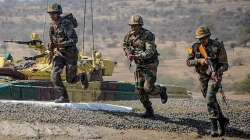Army focuses on imparting Mandarin language training to its personnel
A slew of measures has been undertaken by the Army to improve its in-house Mandarin expertise with an aim to empower junior and senior commanders to engage with Chinese military personnel as and when the situation demands

In the backdrop of a lingering border row in eastern Ladakh, the Army has upscaled its efforts to impart Chinese language training to its personnel as part of the overall strategy to ramp up surveillance along the over-3,400-km Line of Actual Control (LAC). A slew of measures has been undertaken to improve its in-house Mandarin expertise with an aim to empower junior and senior commanders to engage with Chinese military personnel as and when the situation demands, sources in the security establishment said on Sunday.
They said various Mandarin language courses are being run at the language schools at the Northern, Eastern and Central commands of the Army. The Indian Army is also using artificial intelligence-based solutions for the translation of various scripts or literature from the Mandarin language.
"With improved Mandarin skills, the Indian Army personnel will be better empowered to convey their points in a much more cogent manner," said one of the sources. According to inputs, the Indian Army now has a significant pool of Mandarin-qualified personnel drawn from all ranks, including officers and junior commissioned officers (JCOs).
The Army has recently obtained the requisite approvals to induct Mandarin-trained personnel into the Territorial Army. "With a recalibration of its strategic outlook towards the northern borders, the Indian Army has upscaled its Chinese language training and synergistically enmeshed appropriate scaling of Chinese linguists within its overall strategy," said another source.
The sources said Chinese language experts are a functional requirement at the tactical level and are required for providing analysis at the operational and strategic level while catering to futuristic needs.
ALSO READ | Indian Navy completes 4th phase of sea trials for Indigenous Aircraft Carrier
They said an increasing number of Mandarin experts are required for a better exchange of viewpoints and understanding of the Chinese PLA's version of their activities during various interactions such as Corps Commander-level talks, flag meetings, joint exercises and Border Personnel Meetings (BPMs).
The Army has already concluded a memorandum of understanding (MoU) with the Rashtriya Raksha University (RRU), the Central University of Gujarat (CUG) and the Shiv Nadar University (SNU) for imparting Mandarin proficiency to its personnel.
Simultaneously, the in-house efforts include increasing the vacancies at the Army's Training School at Pachmarhi and the School of Foreign Languages, Delhi. The sources said the proficiency-level testing of the trained soldiers is being conducted through civilian institutes such as the Langma School of Languages in Delhi to assess the competence level of the linguists in accordance with international standards.
The armed forces have taken a series of measures in the last two years to strengthen the overall surveillance along the LAC following the military standoff in eastern Ladakh.
The border face-off between the Indian and Chinese militaries erupted on May 5, 2020, following a violent clash in the Pangong lake areas. The standoff escalated after the Galwan Valley clashes on June 15, 2020. Both sides gradually enhanced their deployment by rushing in tens of thousands of soldiers as well as heavy weaponry.
As a result of a series of military and diplomatic talks, the two sides completed the disengagement process last year on the north and south banks of the Pangong lake and in the Gogra area. Each side currently has around 50,000 to 60,000 troops along the LAC in the sensitive sector.
ALSO READ | Jammu and Kashmir: Terrorist killed, jawan martyred as Army foils infiltration bid in Kupwara
ALSO READ | Amarnath Yatra 2022: Indian Army revamps fallen bridge in record time amid heavy rainfall | WATCH